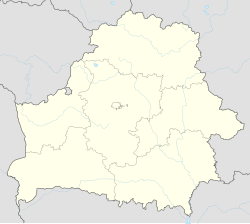| Obal
Обаль (Belarusian) Оболь (Russian) | |
|---|---|
| Urban-type settlement | |
 Remains of Hrabnicki Palace, Remains of Hrabnicki Palace,a cultural heritage monument of Belarus | |
 | |
| Coordinates: 55°21′4″N 29°17′46″E / 55.35111°N 29.29611°E / 55.35111; 29.29611 | |
| Country | Belarus |
| Region | Vitebsk Region |
| District | Shumilina District |
| Elevation | 150 m (490 ft) |
| Population | |
| • Total | 2,114 |
| Time zone | UTC+3 (MSK) |
| Postal code | 222379 |
| Area code | +375 2130 |
| License plate | 2 |
Obal or Obol (Belarusian: Обаль; Russian: Оболь) is an urban-type settlement in Shumilina District, Vitebsk Region, Belarus. It is located 35 kilometres (22 mi) southeast of Polotsk. In 2024, it had a population of 2,114.
History
Obal was known since the 16th century as a village in Połock Voivodeship within the Polish–Lithuanian Commonwealth. In 1772, following the Partitions of Poland, it became part of the Russian Empire. In 1866, the construction of the Riga-Oryol railway contributed to its growth.
During the Second World War, the settlement was under German military occupation from 8 July 1941 until June 1944. Prior to the German invasion, it had a Jewish population of several dozen people. About 10 or 15 Jews remained there at the start of the occupation, and they were placed in a local ghetto in late 1941. Several Jews died during the existence of the ghetto, which consisted of one house, and on 2 June 1942, the ghetto was liquidated, with the remaining six Jews being shot.
In 1968, the status of Obol was raised from village to urban-type settlement.
Geography
Located in the center of Vitebsk Region, Obal lies between Vitebsk (64 kilometres (40 mi) southeast) and Polotsk (36 kilometres (22 mi) northwest), and is crossed by the Obal River. It is located 21 kilometres (13 mi) from Shumilina, 45 kilometres (28 mi) from Novopolotsk and 228 kilometres (142 mi) from Minsk. The town is served by the P20 highway and by the Smolensk-Vitebsk-Daugavpils-Riga railway.
Notable people
- Zinaida Portnova (1926–1944), Russian partisan, Hero of the Soviet Union. In 1942 she joined the Belarusian resistance movement, becoming a member of the local underground Komsomol organization in Obal.
Twin towns
 Ödeshög (Ödeshög Municipality, Sweden)
Ödeshög (Ödeshög Municipality, Sweden)
References
- (in Russian) Obol on globus.tut.by
- ^ "Численность населения на 1 января 2024 г. и среднегодовая численность населения за 2023 год по Республике Беларусь в разрезе областей, районов, городов, поселков городского типа". belsat.gov.by. Archived from the original on 2 April 2024. Retrieved 27 October 2024.
- Gaponenko, Irina Olegovna (2009). Назвы населеных пунктаў Рэспублікі Беларусь: Віцебская вобласць. Minsk: Тэхналогія. p. 505. ISBN 978-985-458-192-7.
- ^ Megargee & Dean 2012, p. 1709.
- 25105764 Obol on OpenStreetMap
- (in Russian) Ufarkinym, Nickolai V. "Портнова Зинаида Мартыновна" [Portnov Zinaida Martinovna]. warheroes.ru. Retrieved 27 August 2016.
- (in Swedish) Info at Ödeshög municipal website Archived 2016-08-27 at the Wayback Machine
Sources
- Megargee, Geoffrey P.; Dean, Martin (4 May 2012). The United States Holocaust Memorial Museum Encyclopedia of Camps and Ghettos, 1933 –1945: Volume II: Ghettos in German-Occupied Eastern Europe. Indiana University Press. p. 1709. ISBN 978-0-253-00202-0.
External links
- [REDACTED] Media related to Obaĺ at Wikimedia Commons